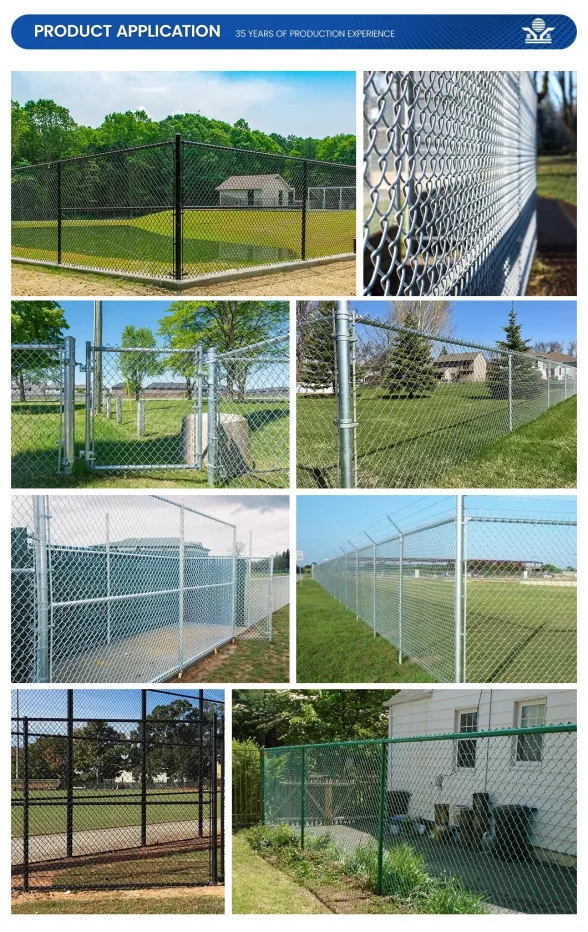Understanding the Costs of Black Cyclone Fencing
When it comes to choosing the right fencing for your property, various options are available, each with its benefits and drawbacks. One increasingly popular option is black cyclone fencing, known for its durability, aesthetic appeal, and cost-effectiveness. In this article, we will delve into the factors influencing the costs associated with black cyclone fencing and provide insights to help you make an informed decision.
What is Black Cyclone Fencing?
Black cyclone fencing, also referred to as chain-link fencing, is made from galvanized steel wire that is woven together to form a strong, durable mesh. The black coating not only enhances the fence's appearance but also helps protect it from rust and environmental wear. This type of fencing is commonly used in residential, commercial, and industrial settings to provide security, delineate boundaries, and create enclosures for pets or children.
Factors Affecting the Cost of Black Cyclone Fencing
1. Material Costs The primary cost driver for black cyclone fencing is the material itself. Prices can vary based on the gauge of the wire, with thicker gauges (lower numbers) being more expensive but also more durable. Typically, the cost of fencing materials ranges from $5 to $20 per linear foot, depending on the gauge and whether it comes with additional protective coatings.
2. Height of the Fence The height of the cyclone fence significantly impacts pricing. Standard heights range from 3 to 12 feet, with taller fences costing more due to the increased amount of material used. A typical 4-foot fence may cost less per linear foot than a 6-foot or 8-foot fence.
3. Additional Features Many homeowners opt for additional features, such as privacy slats, gates, and decorative elements. Privacy slats can add to the overall aesthetic appeal of the fence but will also increase the cost. Gates, especially those that are wider or equipped with locks, will further add to the expense.
black cyclone fence cost

4. Installation Costs Labor costs can vary widely based on your location and the complexity of the installation. On average, you can expect to pay between $10 and $20 per linear foot for professional installation. If the installation is straightforward, you might consider a DIY approach, which could save you a considerable amount, although it requires time, tools, and some expertise.
5. Site Preparation The condition of the land where the fencing will be installed can greatly influence the final cost. If the area is rocky, uneven, or heavily vegetated, additional site preparation may be needed to level the ground or clear obstructions before installation can begin.
6. Geographical Location Prices for materials and labor can vary significantly by region. Urban areas often have higher costs due to increased demand and property values, while rural areas may offer more competitive pricing.
Estimating Total Costs
To estimate the total cost of installing a black cyclone fence, consider all the components mentioned above. For example, if you plan to install a 100-foot black cyclone fence that is 4 feet high, and you choose to use mid-grade material at $10 per linear foot, the material cost alone would be around $1,000. Adding installation costs of approximately $15 per linear foot, the total would rise to about $2,500. If you decide to include a gate or privacy slats, make sure to add those additional costs to your budget as well.
Conclusion
Black cyclone fencing is an attractive and practical solution for a variety of fencing needs. While costs can vary widely based on materials, installation, and additional features, it is essential to evaluate your specific situation before making a decision. By considering the factors detailed above, you can better prepare for the costs associated with black cyclone fencing and ensure that your investment provides both security and aesthetic appeal for your property. A well-installed black cyclone fence can last for decades, making it a worthy investment in both style and functionality.
-
Why Galvanized Trench Cover Steel Grating Resists Corrosion
NewsJul.10,2025
-
The Versatility and Strength of Stainless Expanded Metal Mesh
NewsJul.10,2025
-
Load Calculations in Steel Grating Platforms
NewsJul.10,2025
-
Keeping Pets and Kids Safe with Chicken Wire Deck Railing
NewsJul.10,2025
-
Hole Diameter and Pitch for Round Perforated Metal Sheets
NewsJul.10,2025
-
Aluminium Diamond Mesh in Modern Architecture
NewsJul.10,2025
Subscribe now!
Stay up to date with the latest on Fry Steeland industry news.

